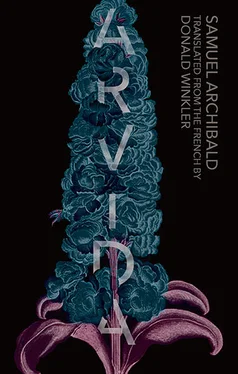She hung up in my face. The next week I passed in front of the house, I turned around in the driveway, and I stopped the car. I found the house beautiful, with its roof broken up by attic windows, the grey asphalt shingles peeling away on top, the two dormers projecting from the front façade, the large cedar shutters, and the hoary whitewashed walls. I couldn’t help myself.
I saw Madame Villeneuve peering out the window, through the curtains. I took off immediately. As if I felt guilty. I breathed a long sigh and for once decided to listen to the voice that always talks into my ear, telling me what to do, and that now was saying, “Forget it.”
A year later, I was living elsewhere. I’d just finished moving with my wife and little girl into a house that I wasn’t crazy about, but that would do us for a while. The telephone rang. It was the good woman Villeneuve.
“Do you remember me?”
“Yes, Madame. What can I do for you?”
“I’d like to know if your offer still holds.”
The truth was, that it didn’t. I’d just transferred everything into the new house, and moved my office. But business was good, and I knew that it wouldn’t take long for me to refill my coffers. I also knew that if Madame Villeneuve were calling me now, it was because she’d spent a good year trying to sell her house.
I said:
“Yes, Madame, it still holds. Except that I can’t give you the money for at least three months. I’ll need time to sell my house here.”
“I understand. That seems reasonable.”
“But there’s one more thing: I’m not going to move my wife and daughter into your shithouse without doing a minimum of renovation.”
She coughed.
“What are you saying?”
“I’d like you out within two weeks.”
“You want to pay me in six months and turf me out today. Is that it?”
“Right.”
“Can I think about it?”
“Take your time, Madame.”
That time I was the one who hung up. It was her son who called me two weeks later. He’d had the papers drawn up, and he was anxious for me to sign. He was in the Saguenay for just one week, enough time to move his mother into a retirement home and liquidate her possessions. At the notary’s, he offered to leave me the furniture or the objects already in place. I replied that they could keep their old rubbish, and that they were lucky I wasn’t charging them to remove the old man’s rusty totems from my property. I then asked him, just to make conversation, if his mother had had him close the deal because she was sick, and he replied:
“It’s not that, no. She says you’re the coarsest person she’s ever met in her life.”
That same afternoon, I went to see the empty house. It was there and it was mine. My humble abode. I’d always dreamed of a house like that, and now I had it. It would take me five, ten, twenty years to fix it up the way I wanted, but that didn’t matter because I’d dreamed for forty years of putting my family into a house like that.
No one believes me, but I managed not to say anything to my wife and daughter for quite a while. I sold the other house through contacts, scheduling visits for when my wife and daughter were out. For five months I did the work in secret, contracting out a few of the jobs. After a while my wife began to think I had a new mistress. I had the tennis court in the back taken out and a swimming pool dug, I had the foundations set right, and I plastered over the strips I’d taken out with the chainsaw. I restored the outside walls and had them painted yellow, a beautiful bright yellow, a bit mustardy, to contrast with the green shingles I’d installed on the roof. I dismantled old man Villeneuve’s sculptures and sold off the pieces as scrap. A lot of people called me a barbarian for doing that, but I have to say that I offered them for free to all the museums in the region as long as they’d come to cart them away, and not one said yes. I painted inside as well. My friends came to help me out from time to time, and at the end I think the whole town knew I’d bought the house except for my wife and my little girl.
One Sunday afternoon, I said, “We’re going on a picnic.” Danièle asked:
“Where?”
“Miville Grenier’s new house. Seems it has to be seen.”
My wife gave a whistle when we went in, and my daughter said:
“Wow, it’s beautiful here.”
My wife asked:
“He’s not here, Miville? I don’t see his car.”
“No, he wanted me to do a bit of inspection.”
My wife toured the house. The second floor was still very much a work in progress, but the first was liveable. That’s what I was banking on. She explored the outside too, in a state of bliss. The little one was running all over with the dog. Danièle said:
“They’re lucky, Miville and his wife. They’re going to have a really beautiful house.”
I threw her the keys and I said:
“Just as well, because it’s not Miville’s house. It’s yours.”
She looked at me wide-eyed, as if she didn’t understand.
“Don’t give me that,” she said.
“I mean it.”
I remember everything after that, but not in order, I remember it like it was all happening at the same time. My wife jumping into my arms, my wife going to get Julie and telling her “It’s our house, it’s our house!”, the dog yapping, everybody running around. She can say whatever she likes, she’ll never take that moment away from me. Never mind if my ex now says she found the house too big and too old and it was all wrong because the little one was already scared the very first time she saw it. It’s not true. She was happy that afternoon. I was the best husband and father in the world and we were happy, all three of us. And it stayed that way for a while before things really went bad.
It’s funny, because I remember Danièle’s smile, and Danièle’s smell and her taste, I swear, but I can’t any more say a kind word about her. I figure I wouldn’t speak so badly about her if I hadn’t loved her so much. She’s gone now, and my little girl’s gone, and I’m living in the house with another woman. I don’t love it the way I did at the beginning even if today it’s my house, my very own house. It’s not the same as when I was fixing it up.
Not many people will understand me, but there’s something strange about taking over an ancestral domain. This wasn’t my first house, but it was the first that made me feel like I had to wrest it away from somebody. Before I took advantage of the Villeneuves’ decline and snapped it up, three generations had lived in the house, never doubting that it was theirs by right. When a man buys a place like that, he buys the nest and protective shell of someone else, someone else’s wiring, and someone else’s ideas, and he has to decide how far he’s going to go to become that person, how much of that man he’s prepared to graft onto himself. And there’s no getting around it. Two men had inherited the house. From the little I knew, it was Hermenégilde Villeneuve who’d built it at the turn of the century as a summer house for the family, Médéric Villeneuve who’d modernized it and turned it into a principal residence, and Viateur, the artist, who’d let it run down to the point where I was able to buy it.
It was Médéric, in particular, who haunted my thoughts while I was going over his improvements. That he might have delegated many of the jobs to someone else didn’t even occur to me. People like me, they hone their skills at an early age on the cabins and then the houses of the men in their family. By the time I’d made my first purchase, there was a lot I could already do. Médéric, it seemed, had learned everything on the job, on just this one site. I could date the work by the differences in quality. The plumbing was impressive, even if it had started acting up in old age. The wiring was done any which way. He’d used newspaper to insulate some of the walls I tore down. I smoothed out the pages to see what was written there. Hardly anyone will believe me, but there was a lot of talk about the Cuban embargo and the Warren Commission. The carpentry was beautiful. The roof had been well built at the time, but Viateur had let it run down.
Читать дальше












